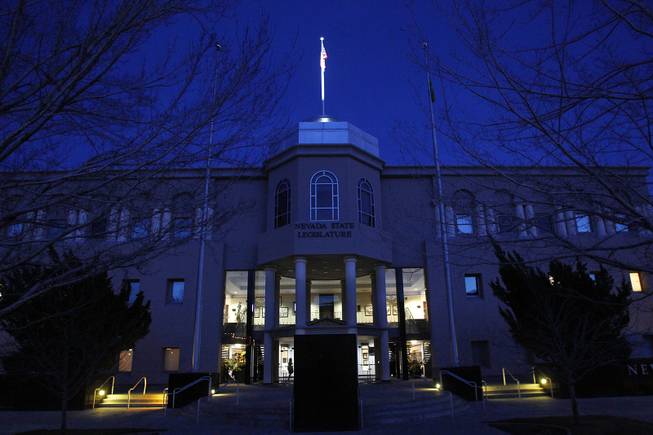
Sam Morris / Las Vegas Sun
The Legislative Building is seen at the end of the first day of the 2013 legislative session Monday, Feb. 4, 2013 in Carson City.
Friday, April 12, 2013 | 2 a.m.
Sun coverage
Today marks a mass extinction day at the Legislature.
Bills lacking the athleticism to sprint past today’s deadline for committee passage die a cold death of neglect, never to see a vote on the floor or life in the opposite house. They will never make it to the governor’s desk for a veto-or-sign decision.
That is, except for the zombie bills.
Yes, that’s right: the zombie bills. Much like a zombie, a bill at the Nevada Legislature doesn’t necessarily die once.
Sometimes a legislator or lobbyist scores a decisive kill shot. Today is one such opportunity for that if a policy committee votes down or simply tables a bill so it will no longer progress through the process.
“Some bills you won’t see again, and that at least reduces the noise,” said Sean Higgins, lobbyist for Porter Gordon Silver.
But just when you’re not looking, a reanimated bill can rise, rip open a warm-blooded bill, consume its innards, and crawl inside the skin of its new host: a zombie bill in a new suit.
So today’s deadline and several others in the second half of this legislative session are somewhat meaningless. Sure, the easiest way to pass a bill is to meet the deadline, ensuring that the committee votes it to the floor for a full vote. But that bill that you love or hate might never really die during the session.
“We all know that bills are not dead forever until the Legislature adjourns,” said Jim Wadhams, veteran lobbyist with Fennemore Craig Jones Vargas.
The final adjournment — called sine die — is the only magic panacea that kills all zombie bills.
Yes, many ill-conceived, politically unpopular or unworkable bills will meet their demise over the course of the legislative session. That’s by design; a legislative session is a deadly obstacle course for bills.
But dedicated, influential or wily legislators and lobbyists can resurrect a bill.
Here’s how:
Resurrection by amendment
The Legislature loves change. Amendments can polish out the flaws in a mediocre bill and really make it shine. But lobbyists and legislators alike can also use amendments to take over a host bill with their own ideas.
Mary Lau, lobbyist and president of the Nevada Retail Association, calls the amendment practice the “Legi-matic.”
The “Legi-matic” machine will take the text of your dead bill and, voilà, make it new and whole again by attaching its contents to another bill.
Lobbyists can also introduce phantom bills, amendments that sweep quietly into the Legislature and possess an existing piece of legislation.
NV Energy used this practice this month when it rolled out its big “NVision” proposal by attaching the heretofore unknown idea to an existing bill.
The same amendment practice can also sink a bill. An amendment can turn the once-attractive bill into an ogre in the eyes of a key legislator, thus turning support into opposition.
Resurrection by fiscal note
Like the conclusion of a gladiatorial contest, many bills live or die at the pleasure of a ruler. In this case, the arenas are committees, and the rulers are committee chairmen or chairwomen. A bill that doesn’t get a vote dies.
But, that bill you love can find salvation and escape death. Like in the movies, a bill can be only mostly dead.
A legislator or lobbyist can find a way to make the bill’s proposal cost money — in legislative speak a fiscal note is procured. That grants a bill an automatic exemption.
The bills that cost money get shuffled to the Assembly and Senate money committees, where they don’t expire until the end of the legislative session.
Resurrection by conference committee
A bill must pass both the Assembly and Senate, and often a bill gets voted out of one chamber and then is ripe for amendments when it moves through the other chamber.
If one house amends a bill that originated in the opposite house, it goes to a conference committee, where members of the Assembly and Senate are supposed to sit down and sort out their differences.
When that happens, a clever lobbyist or legislator can eject the contents of the bill and steer the vehicle in a whole new direction.
A bill about casino employees, for example, can become a bill allowing online gambling when it goes to conference committee.
Resurrection by leadership
The most difficult way to keep an idea alive is to appeal to the powerful Senate and Assembly leadership.
The top legislators from both the Democratic and Republican parties have special, emergency bills they can introduce at any time.
So a cloaked proposal can move through the legislative session with disregard to deadlines. The bill can make its public debut late in the session, and if a lobbyist or legislator is especially lucky, that bill can contain an idea that died earlier in the legislative session.
Leadership can also waive the rules for specific bills.
By the end of the legislative session, lawmakers usually vote to waive all the rules with an eye toward efficiency in the final, hectic days of the legislative session, opening yet another amendment frenzy.

Join the Discussion:
Check this out for a full explanation of our conversion to the LiveFyre commenting system and instructions on how to sign up for an account.
Full comments policy